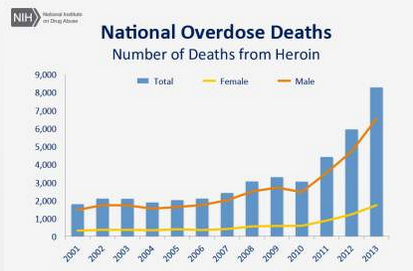Abstract
By the end of my speech, the audience will be better informed about the drug use problem in the United States as well as about health and life risks associated with the use of heroin. Drug use is a globally important social problem that needs detailed discussion because increased levels of drug abuse are associated with growing rates of mortality, and heroin addiction is one of the main causes of drug users’ deaths.
Main
Statistics show that about 270 million people suffer from the drug abuse and substance addiction globally. Among them, about 203 million people use cannabis, 39 million people are addicted to opioids and cocaine, and more than 20 million people inject drugs. Looking at the graph, it is possible to examine the situation in the United States typical for 2012. Thus, the surveys demonstrate that in 2012, about 19 million Americans used marijuana; more than 1 million people were addicted to cocaine; and about 300 thousand people injected opioids like heroine.

In 2013, Christopher Jones from the US Centers for Disease Control and Prevention published the data on the use of heroin by Americans in 1999 and 2009 and concluded that heroin addiction led to the increase in the overdose death rate in about four times. The statistics and survey data are shocking and rather unexpected, but they demonstrate that drug use, and specifically heroin use, is not only global but also a national problem.
Years ago, I did not pay attention to such statistics, but the widespread reported cases of drug abuse and deaths because of overdose among the members of the community made me focus on this topic and study it from different perspectives. I am aware of the importance of making people understand the aspects of the drug use problem in the society, and, especially, the risks of heroin addiction. My task today is to explain the main aspects of the drug use problem and overview the whole issue, identify the features of heroin addiction, and discuss adverse health consequences as well as striking mortality rates. The first point that I plan to discuss is the features of the drug use problem in the United States and worldwide.
Discussions of drug use usually attract the public’s attention because people can only guess about the real scope of the problem in the United States and over the globe. It is rather difficult to conduct the accurate estimation of drug users nationally and worldwide, but there are statistical data to support the vision that the use of cannabis, cocaine, opioids, and amphetamines leads to dramatic social consequences. Professors Louisa Degenhardt and Wayne Hall see the problem of studying the question in Illegality of drugs that leads to impossibility of researching the actual numbers of people using drugs and situations making these persons initiate the drug abuse and harm their health.
In the United States, the age of the first use of drugs actively decreases in contrast to the growing popularity of injected drugs. Many researchers state that the drug use is significantly dependent on social factors, and there are certain risk groups. Young males, persons from disadvantaged social environments, and persons consuming tobacco and alcohol are usually discussed as belonging to these risk groups. Still, the determined groups are rather broad, and they can include different persons from low-income or high-income families or from low-income and high-income nations. These persons can become addicted to drugs because of the impact of relatives or friends. Thus, the identification of risk factors cannot protect people from using drugs because any person can be in the group of risk due to his or her psychological state or specifics of social interactions.
As a result, many paths can lead to the heroin addiction as one of the severest forms of drug addiction because of the particular qualities of injected opioids. So, people often start using opioids in order to relieve pain, and then, to achieve euphoria. However, the consequences of such experiences can be dramatic as heroin can also cause coma following the overdose. Moreover, the heroin addicted persons often cannot get rid of their problem independently because heroin addiction is associated with the physical addiction, changes in the brain, in reactions, and in cognitive processes. In addition to difficulties with treatment, it is a challenging task to identify risk factors for heroin addiction.
Thus, heroin users are observed in different social circles, they can become addicted during adolescence, early adulthood, and even late adulthood. These people become addicted quickly because of the qualities of opioids, and they can reject the fact of addiction during a long period of time, while harming their health and destroying their social life. So, if a person starts using drugs like heroin, they change the physical state and health significantly. Therefore, it is necessary to focus on the adverse health consequences of drug use, and heroin addiction in particular.
Health effects of drug use can be acute and chronic, depending on the period of addiction and the qualities of the drug. In this case, heroin addiction is most harmful for a person. The most typical acute health effects of using drugs are intoxication and problems with cognition. The percentage of psychosocial effects like suicides, accidents, and cases of aggression and violence is also high. Researchers and physicians also focus on the chronic health effects, and they note that dependence or the chronic use of heroin and other drugs leads to such effects like psychosis, mental disorders, the organ damage, cirrhosis, and the cardiovascular disease.
Furthermore, it is typical for heroin addicted persons to suffer from depression, conduct disorders, hepatitis B, and hepatitis C. Nevertheless, the main problem is in the fact that heroin addiction leads to increased mortality rates among the young population of the United States. The reason is that heroin addiction causes the development of such chronic conditions as hepatitis and even HIV. Moreover, the overdose of injected drugs often causes the immediate death. The risk of the death increases because many heroin addicted persons use the drug in combination with different types of depressants and alcohol. In 2014, National Institute on Drug Abuse published the data on the number of overdose deaths for the period of 2001-2013 presented in the chart. Thus, in 2013, about eight thousand Americans died from the overdose and heroin addiction.

It is important to state while concentrating on these numbers that heroin addiction, as any other type of drug addiction, damages each part of the person’s life with the main focus on the psychological and physical health.
Therefore, drug use is a problem that leads to the tragic consequences and to the dramatic situation in the society, when numbers of substance users increase, rates of mortality grow, and heroin addiction becomes spread among all age categories of Americans. Now, it is possible to conclude that drug use is a problem that is typical for many nations; heroin addiction is one of the most harmful forms of drug addiction; and the consequences of such addiction are often catastrophic for individuals. I am sure that being informed about the risks of drug abuse, people can contribute to protecting the society from the drug epidemics and overdose deaths.